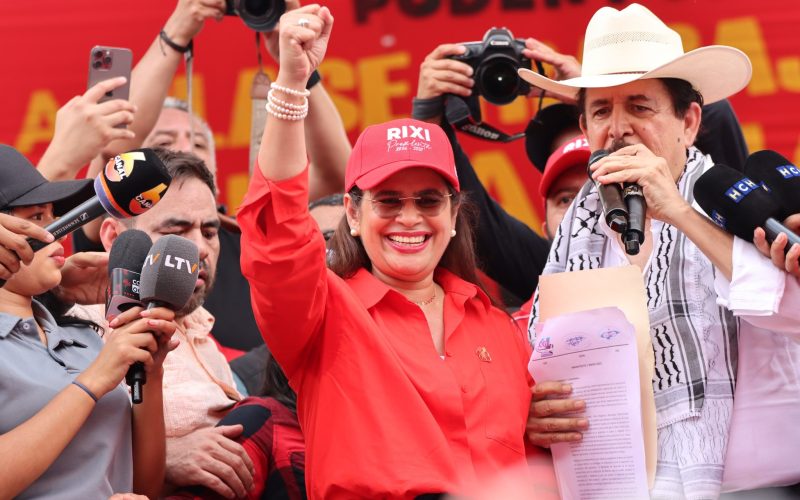The presidential candidate of the ruling LIBRE party, Rixi Moncada, has experienced a drastic decline in popularity, according to the latest polls, reflecting growing rejection of the socialist proposals promoted by her party. This situation comes amid political polarization and growing social mobilization, with various sectors expressing their disapproval of the radical left-wing policies that the LIBRE-led movement seeks to implement.
Rejection of LIBRE’s socialist model
Recently, surveys have indicated a notable change in voter preferences favoring Rixi Moncada, who was initially showing a strong position in the polls.
However, support for her has begun to wane as citizens become increasingly reluctant to back a socialist model, particularly amid fears that the country will follow in the footsteps of other Latin American examples with radical left-wing governments, such as Venezuela and Cuba.
The main fear among Honduran voters is the possibility of facing an economic and social crisis similar to that of these countries, where poverty, repression, and lack of freedoms have dominated the agenda. Added to this concern is the perception that LIBRE’s promises of transformation could be aligned with an authoritarian project that does not have the support of broad sectors of the population.
The role of the opposition and social mobilization
In this context, the opposition has played a crucial role in criticizing and questioning the model of government promoted by LIBRE. Political sectors opposed to the ruling party have taken advantage of the decline in the polls to reinforce their positions and consolidate a discourse against what they consider a project of “radical socialism.”
Meanwhile, public protests have intensified, notably led by the Catholic and Evangelical churches, who have criticized LIBRE’s initiatives as a challenge to the nation’s longstanding values. These protests have influenced not only public spaces but have also affected voting patterns, reflecting increasing skepticism towards the governing party’s vision for renewal.
Los analistas políticos coinciden en que esta dinámica podría estar debilitando las bases de LIBRE, que aunque sigue siendo el partido oficial, enfrenta un deterioro considerable tanto en el ámbito político como social. La percepción de que el socialismo radical promovido por Moncada podría llevar a Honduras a una crisis similar a la de otros países latinoamericanos está consolidando un rechazo generalizado entre la población.
Doubt regarding the nation’s political prospects
The fall of Rixi Moncada and the rejection of LIBRE’s socialist project have opened up an uncertain outlook for the presidential elections in Honduras. Popular discontent could mean a change in the country’s political dynamics, where citizens seem to be calling for a change of course from the economic and social model proposed by the current government.
The electoral landscape now looks like a battlefield where voters seem increasingly concerned about the consequences of a possible shift toward socialism. In this context, the future of LIBRE and its project to rebuild the country is at a crossroads. Moncada’s decline in the polls not only jeopardizes his candidacy but also calls into question the viability of a political model that has created deep divisions in Honduran society.
A social and political landscape characterized by division
Este fenómeno pone de manifiesto la intensa polarización que atraviesa la política en Honduras. Aunque ciertas partes siguen respaldando el modelo sugerido por LIBRE, otros rechazan totalmente cualquier intento de avanzar hacia políticas de izquierda radical. La sociedad hondureña está dividida, y las elecciones presidenciales de este año se perfilan como un momento crucial para determinar el rumbo futuro del país.
In this atmosphere of tension, it will be essential to watch how the following weeks develop and whether the opposition can leverage public dissatisfaction or if LIBRE can re-engage with its supporters. The scenario also presents a challenge for the nation’s institutions, which need to ensure an election process that is independent of external influence and supported by an informed and discerning public.
